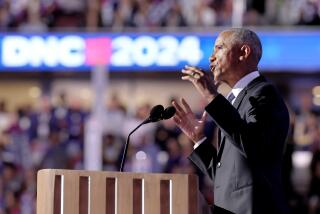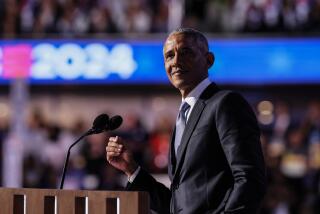Obama’s task for midterm election: recapture 2008 magic
- Share via
Reporting from Washington — Democratic strategists looking to stave off major losses in the upcoming midterm election have devised a precise and targeted role for President Obama: recapturing the enthusiasm he generated as a fresh-faced candidate vying to become the nation’s first black president.
The assignment comes with a delicate side note. Not every House Democrat wants him to campaign in his or her district, for fear of alienating independents who’ve grown disenchanted with Washington.
“We’ll be going where candidates ask us to go,” said White House senior advisor David Axelrod. “We’ll raise some money. And in the end, it will be important for him to communicate to those voters who supported him in the last election and might not generally vote in an off-year election as to why it’s important to come out. And only he can really do that.”
However, even the White House concedes that rekindling 2008-style enthusiasm when Obama isn’t on the ballot will be a tough sell. Daniel Pfeiffer, the White House communications director, said in an interview that Obama’s following “is not directly transferable.”
But if Obama succeeds, he could boost turnout in November and help stem his party’s expected losses.
The White House believes the job is one that Obama alone can do.
Democratic majorities swelled in 2008 because of younger voters and minorities drawn to Obama’s campaign. In the upcoming election, Obama’s task will be to resurrect the political bond and emotional connection he forged with these first-time voters, who accounted for 11% of the 2008 electorate.
Some House Democrats welcome the plan, describing it as preferable to having Obama campaign in more conservative districts where his message isn’t resonating.
One House Democratic aide said, “We don’t want to be seen with him, but we still need our base to turn out, and our base pays attention to him.”
In a tag-team arrangement, the White House is carving out a separate campaign role for Vice President Joe Biden that tries to leverage the pair’s distinct political skills.
While Obama raises money and tries to rekindle key elements of his 2008 coalition, Biden will crisscross the country, paying special attention to working-class districts that may be more receptive to his blue-collar persona. As the president sells the larger economic message — recovery is on the way, once his programs have time to work — Biden will cast the policies in more personal terms.
For months, Biden has been on tour promoting the $800-billion stimulus package, making the point that local projects are succeeding, even if the overall stimulus is unpopular.
Biden’s message is a bricks-and-mortar one, about how the Recovery Act is “building roads, keeping teachers in the classroom,” said a senior administration official who was not authorized to comment publicly and spoke on the condition of anonymity.
No matter how faithfully the White House executes the strategy, losses appear inevitable, and White House Press Secretary Robert Gibbs said on NBC’s “Meet the Press” on Sunday that “there’s no doubt” enough seats were in peril for Republicans to take control of the House. The idea here is to minimize defeat.
“We understand that the tide of history is against us here,” said Hari Sevugan, a spokesman for the Democratic National Committee.
Fresh evidence appears almost daily of the White House’s weakened position. In a new Gallup poll, Obama’s support among independent voters — a mainstay of his 2008 victory — fell to 38%, down 18 percentage points over the last year.
As it stands, turnout favors the opposition. An energized Republican Party is eager to vote, with 56% of Republicans polled reporting they are more enthusiastic about voting this year than in past elections, according to a Pew Research Center poll. By contrast, 42% of Democrats reported to be more enthusiastic this time around.
In more conservative districts that Democrats hold, the president isn’t a particularly welcome campaign presence. Alan Kessler, a Philadelphia lawyer and longtime Democratic fundraiser, said it made little sense for Obama to campaign in certain battleground districts in Pennsylvania.
“His numbers are low, and I suspect there are going to be areas of Pennsylvania where people are not going to be anxious for him to come and, quite frankly, he’s not going to be anxious to come in,” Kessler said, pointing to the reelection campaign of Democratic Rep. Patrick J. Murphy in the GOP-heavy Philadelphia suburbs: “Do you think Patrick Murphy wants President Obama to set foot in his district?”
Races such as these are where Biden might be a useful proxy. Some conservative Democrats are clamoring to get a visit from the vice president.
In Portland, Ore., on Thursday, Biden headlined a $200-a-plate fundraiser for Rep. Kurt Schrader, a conservative Democrat who has boasted since his election in 2008 about reining in government spending. Folksier in style, Biden is trying to reach voters who may not be in sync with Obama.
In his remarks, Biden said of Schrader: “I encourage you, old buddy, to speak out. You’re independent. Don’t let anybody take that out of you.”
More and more, Obama is taking on a partisan tone. He is weaving a story line peopled with villains and heroes, fools and leaders.
In a speech Thursday in Las Vegas, he mocked Sen. Harry Reid’s election opponent, Republican Sharron Angle, saying she “favors an approach that’s even more extreme than the Republicans we got in Washington. That’s saying something.”
Some Democratic political veterans are skeptical Obama can reach the voters he’s targeting.
Tom Leonard, a Philadelphia lawyer and longtime Democratic Party fundraiser, said in an interview: “It’s possible that bringing in Obama could juice the Democratic base and get them to the polls, but right now I don’t feel a lot of energy to vote.”
Obama isn’t the first president to puzzle over the right role during midterm election season.
In 1982, President Reagan’s approval rating was in the 40s and unemployment was nearly 10%.
A Reagan speechwriter at the time, Ken Khachigian, consulted with a presidential pollster and was told the basic message for the midterm election should be: “Stay the course.”
“It turned out not to be a good idea,” Khachigian said. Republicans lost 26 House seats that year.
With Obama in power, it’s the Republicans who are mocking the stay-the-course message.
Indeed, as Obama made his way toward last week’s fundraising event in Las Vegas, House Republican leader John A. Boehner of Ohio ridiculed the president’s contention that the nation is “moving in the right direction.”
“With all due respect, Mr. President, America doesn’t agree,” Boehner said.
More to Read
Get the L.A. Times Politics newsletter
Deeply reported insights into legislation, politics and policy from Sacramento, Washington and beyond. In your inbox twice per week.
You may occasionally receive promotional content from the Los Angeles Times.











